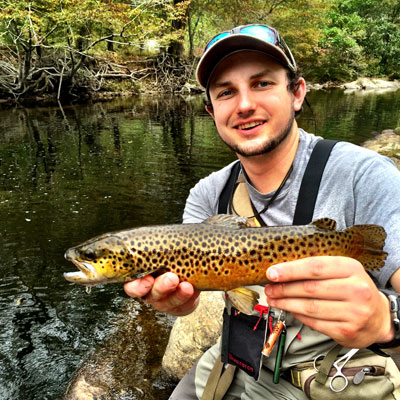Recently, a local young angler asked me the inner workings of what it actually takes to be a fly fishing guide, and how I got to be one in the first place. Considering that this is a question I think many up and coming anglers who are interested in guiding might have; I decided to briefly write my own perceptions and experiences on what it actually takes to be a fly fishing guide here in the mountains of Western North Carolina.
Guiding isn’t a career that can be entered into haphazardly, to be frank. It’s a serious profession that requires one to have mastered and experienced a wide variety of different fishing situations and techniques. This is what helps to develop a guides “instinct.” Often, when I am guiding, I’ll get a gut feeling about something I should try, and more often than not, it ends up working. That instinct of what to do, or not to do, comes from many years of trial and error, learning how to fish different types of water, and adapting to unforeseen situations, such as bad weather or crowded water (which around here, I can promise you will run into plenty of both). Also, I cannot stress enough that this is a profession. This means you have to behave accordingly and have your gear organized, vehicle/ boat running properly, and looking somewhat proud of your appearance. No, you don’t have to wear a suit, but you also shouldn’t go out looking like a bum either.
Being a guide also means being a teacher, and a very patient one at that. My clientele ranges from incredibly experienced anglers to folks who have never held any sort of fishing rod (let alone spent time in the outdoors) in their lives. Every person learns and responds to criticism differently. This, to me, tends to become one of the more stressful components of the job: learning how to read people. One method of teaching someone how to fish isn’t always going to work for the next person, so you have to be willing to not only teach, but also help remedy any mistakes your clients make (if I had a dollar for every knot untangled or fly lost in a tree…). This is part of the job that can sometimes be incredibly frustrating, and being willing and able to spend time talking to someone in a polite manner on how to correct their errors fishing can go a long ways in leading to a successful trip.
Speaking of success, I gauge the successfulness of my trips not in the numbers of fish that are caught, but whether or not the person learned something. That could be either a new style of fishing, or why conservation on our streams is so important. As guides, we hold an incredible responsibility to help manage and maintain the health of our waterways, and part of that comes from dedicated efforts to educate folks on why our mountains and the streams we guide on are worth protecting.
If guiding is something that you feel you would be proficient at, then I would advise first learning under a current guide from an accredited outfitter, the in’s and out’s of the job. It also helps you make crucial connections that can help make your future career in guiding, a lucrative one. As long as you are patient, willing to learn, and have an honest desire to teach, then working as a professional fly fishing guide just might be your calling.
Ethan Hollifield is an Environmental/Physical Science Teacher and is also a guide for Southern Appalachian Anglers
